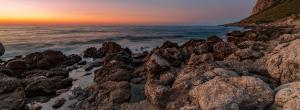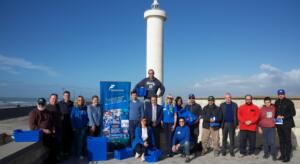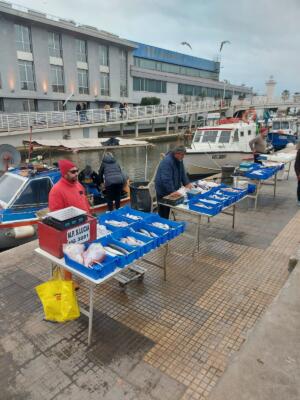
Sovvenzioni
CONSERVAZIONE DEGLI AMBIENTI MARINI
Bluefishers
€21,000 awarded
Background
Expanded Polystyrene (EPS) is widely used in the seafood industry for fish crates, due to its insulating and water-resistant properties. It is also a serious environmental hazard, breaking easily into millions of micro-fragments which persist in the marine environment for centuries, and can be ingested by fish, seabirds, and filter-feeding organisms. These particles accumulate along the food chain, ultimately ending up in seafood consumed by humans.
Italy uses an estimated 50 million polystyrene fish boxes every year, many of which end up in the sea and along beaches. Addressing this source of marine litter is urgent and requires scalable alternatives.
The Project
Launched by Marevivo, one of Italy’s oldest environmental NGOs (founded in 1985), the Bluefishers project works to reduce EPS marine pollution by introducing reusable and recyclable polypropylene fish boxes.
The initiative was piloted in Viareggio, in collaboration with Marevivo’s Tuscany Delegation, the municipality, coast guard, port authority, and the Cittadella della Pesca, a cooperative representing nearly the entire local fishing sector.
Beyond providing a sustainable alternative to EPS, the project engaged directly with local artisanal fishers, raising awareness of the environmental impacts of polystyrene waste. These reusable boxes are guaranteed for two years, after which they can be recycled into new boxes or used for a range of other purposes including road surfaces. They have been designed by DuWo with circularity in mind and can be tracked throughintegrated microchip technology.
The project has also fostered strong community engagement, with fishermen reporting high levels of satisfaction with the new system. The initiative has gained visibility through local and national press campaigns.
Results achieved:
- 2,320 reusable crates distributed to 70 fishermen with 58 small boats
- Replaced 35,000 polystyrene boxes
- Prevented 35 billion microplastics from entering the sea
Looking Ahead
The long-term ambition of Bluefishers is to scale this model to other ports in Tuscany and beyond, gradually replacing EPS with sustainable alternatives throughout the fishing industry. By combining direct environmental impact with awareness raising and advocacy, the project represents a concrete step toward a future national ban on polystyrene in seafood logistics.


